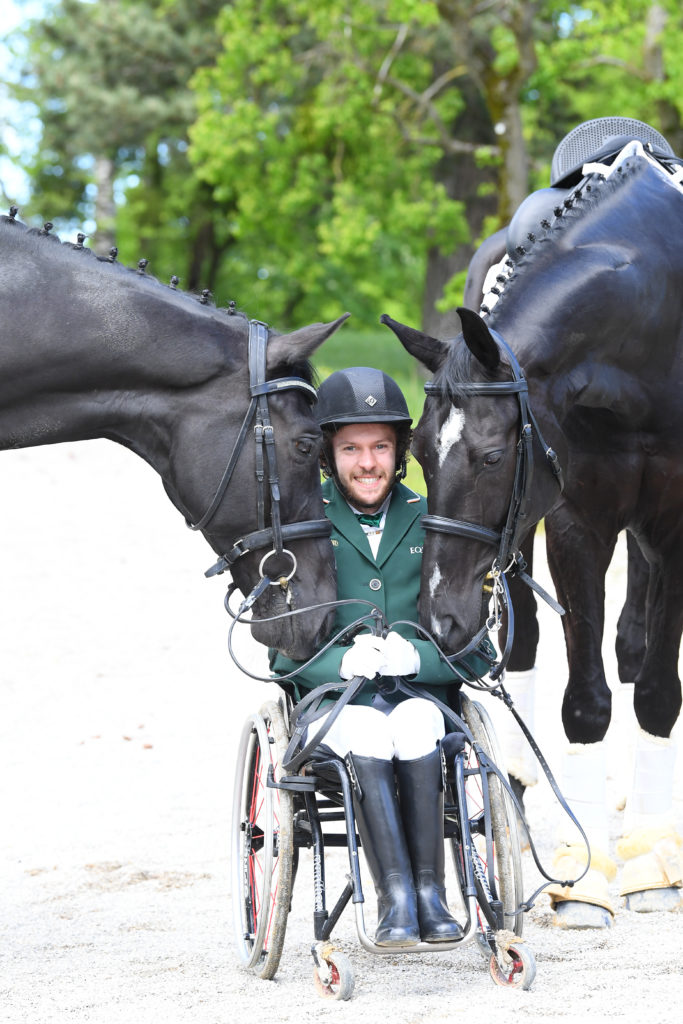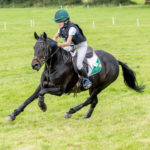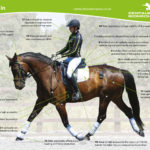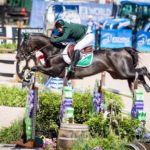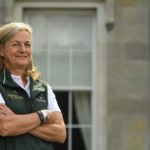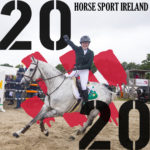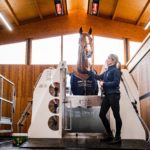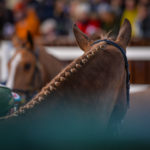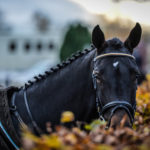Michael Murphy – A True Inspiration
- 23 August 2021, 10:25

Michael Murphy and his Olympic horse Cleverboy in action at the CPEDI three-star at München International where they won both the team and individual tests as well as finishing second in the freestyle.
This week Ireland’s Paralympic dressage team of Rosemary Gaffney with Werona, Kate Kerr Horan with Serafina T, Tamsin Addison with Fahrenheit and Michael Murphy with Cleverboy, managed by Debora Pijpers will get their campaign underway in Tokyo. Ahead of the competition, Leanne O’Sullivan caught up with team member Michael Murphy to talk about his journey to the Games and what it means to him to represent his country.
There is only one word that truly befits para-dressage athlete Michael Murphy and that is – inspirational.
Despite being born with a rare condition called Dejerine-Sottas which has left him with severe muscle weakness and a lack of motor control, Michael chooses to focus on achieving his dream, to represent Ireland at the Paralympics, and in doing so inspires the people around him to reach greatness in their own right.
Michael recalls how this dream was hatched with great clarity, “I was seven at the time and I was competing at the RDA [Riding for the Disabled Association] regionals. I remember riding my pony into a halt during our dressage test and you were supposed to halt for about five seconds. I decided to count the seconds aloud so that everyone knew I had done it for the recommended time. It wasn’t really the appropriate thing to do, but I subsequently qualified for the RDA Nationals and that is where it all started. By the age of 10, I was riding at junior international level in para-dressage and I remember thinking to myself – I’m going to go all the way to the Paralympics.”
Michael admits: “I obviously didn’t quite realise at that age all of the work that it would take to actually get there but I certainly had decided then that this is what I wanted to do.”

Michael Murphy pictured with (l-r) Paralympic teammates Tamsin Addison, Rosemary Gaffney and Chair of Para-Equestrian Dressage High Performance Committee Dara Kearney
As we say in Ireland – no better man.
The qualification and selection process for the Irish team was no mean feat and it was been made considerably more difficult due to the impact of the Covid-19 Global Pandemic. A lack of opportunity to compete could result in athletes losing their competitive edge, but not Michael Murphy. He saw the lull in international competition as an opportunity to improve himself and his horses.
“When the decision was made to postpone the Paralympics, I sat down with my team and said right what can I do now to give myself the best opportunity to be selected when the time comes. I actually ended up getting two new and very competitive horses to ride, former Grand Prix horse Cleverboy and the very promising Dark Diamond. With no distractions, I just focused completely on improving myself with the aim of coming back better than I was in 2020.”
In true Michael Murphy fashion, he came back fighting and at his first international competition in over a year, the CPEDI three-star at München International aboard Cleverboy a new horse whom he had never competed on internationally before, he went and won both the team and individual tests as well as finishing second in the freestyle.
“Having had so much time to prepare, my team and I were like a well-oiled machine. We were quietly confident – Cleverboy is a very experienced horse so we knew the atmosphere wouldn’t be an issue for him. I also knew when we walked down the centre line that his presence and ability was going to rattle some of the competition, so all I had to do was just focus on riding the best test I possibly could and I’m just delighted that it was good enough for first place. It was an amazing moment for me and my whole support team because it truly was a huge team effort.”
The Power of Sport
A truly amazing achievement, but even more so when you consider how Michael’s equestrian journey began. “At age four, my doctor suggested I try horse riding as a form of physical therapy. I remember going to Penniwells, a local riding centre that catered for people with disabilities, and the first pony I sat on was called Nikki. According to my mum I had a smile on my face the entire time. I do remember I had a great time and after that I started going every week and slowly I was able to lose the people who were there holding onto me while I was riding to make sure I didn’t fall off. So, it definitely helped with my strength and I really enjoyed that.
“The RDA were fantastic, Sarah Healing was overseeing my therapy and she saw that I not only loved horse riding and that I was getting stronger as a result but she saw potential in me too and she really took me under her wing. When I showed an interest in competing, she was always there to offer advice and help when needed. But it wasn’t just me, she gave every rider an equal opportunity to reach their full potential. The RDA is a fantastic organisation and I wouldn’t be where I am today without their help and support.”
“It takes very special horses to be able to work with para-athletes because the way we communicate with the horse through our aids is so different to able-bodied riders.”
There is something truly unique about the bond between horse and rider, but a successful partnership in para-equestrian sport is a bond unlike any other. As Michael explains; “It takes very special horses to be able to work with para-athletes because the way we communicate with the horse through our aids is so different to able-bodied riders. For example, often when a horse goes into a competition where there is a big atmosphere they look to the rider for confidence, but I can’t give a horse an aid with any kind of strength to say ‘It’s ok I’m here’, they have to be incredibly confident themselves and incredibly kind and willing to work with their rider.
“It’s really such an impressive sport because to be competitive the horse has to have so much power and presence but also has to be able to contain that power because as a rider, I am so vulnerable. If the horse doesn’t want to do something, then there is nothing I can do so when you see para-dressage it’s very special the bond you are seeing between horse and rider.”
Reflecting on the role sport has played in his life, Michael had this to say: “Sport has always been central to my life. Whether it’s riding horses, playing wheelchair basketball, or attempting to play football, when I play sport nothing else matters. I’m also very competitive so sport was a way for me to channel that into something productive.
“When I became involved in para-specific sports, taking part gave me a real sense of freedom and belonging – it gave me an opportunity to relate to people and it was so important in terms of building my own confidence and keeping in good physical shape.
“As I get older, sport has only become more important. From age four to seven, apart from being a bit wobbly, you wouldn’t really notice anything different about me but as I have gotten older, I have slowly lost the ability to walk. The only way to try and counter the effects of the disorder is to be as active as possible. When I look back now, I understand that was the reason my mum was so keen for me to be involved in sport as a child – she wanted to give me a chance to physically save myself. Sport is important to my physical and mental health now more than ever.”
Source of Strength
Michael has had to overcome many obstacles because of his condition, but he credits the love and support of his family and friends for giving him the courage and strength to chase his dreams. “My whole life my family has been behind me, encouraging me, supporting my dreams and ambitions. I think you need that support, especially at a young age, to give you the courage to challenge yourself, push through and not give up,” Michael says.
In 2015, when Michael was just 18, his older brother James was tragically killed saving another person’s life, but Michael has managed to channel that loss into a sense of purpose; “My older brother spent his whole life believing in me and willing me to realise my dream, I just want to make him proud and that always pushes me to try my hardest.”
Michael’s mum Sue is another great source of strength and inspiration for Michael; “My mum fought really hard for me to be able to go to mainstream school. The recommendation at the time was to send me to a more specialised school that would be set up for what was described as ‘my inevitable deterioration’ but my mum said no. She knew I was capable, and she fought for me. I went to mainstream primary and secondary school and I’ve just graduated from Warwick University with a First-Class Honours in Biology, that’s just one example of why my mum is so amazing.”
Michael admits: “I’ve always been a bit of a science nerd and I really wanted to do something that would make a difference. I now work for a London construction company where my role centres around being an environmental advisor. I really enjoy my job and I believe that anything that helps the environment is making a difference.”
Managing his condition, a full-time job and a demanding sport schedule can be challenging at times, but this is where friendship comes in: “I am very lucky to be living with a group of friends that I went to college with, they don’t treat me differently to anyone else and they don’t let the wheelchair get in the way of having fun which is important too, especially on the days where things aren’t going to plan.”
The Olympic Flame
Few can say that they have been part of the Olympic torch relay, but Michael Murphy is one of the lucky few. The torch he carried during the London Olympic torch relay in 2012 takes pride of place at home and is a constant reminder of his ultimate dream. Explaining how the opportunity came about, Michael explains: “I was part of a programme called the Lloyds TSB Local Hero Programme which was an educational sponsorship programme for young athletes with the potential of competing at future Olympics. The programme supported athletes across all sports, both abled and disabled. In 2012, five members of the programme would be given the opportunity to take part in the 2012 Olympic torch relay and I was one of those lucky people.
“It was an incredible experience, I remember getting off the bus at my station just ahead of the torch arriving and the streets were packed, there were loads of celebrities there and I was so nervous. They handed me the torch and I just remember thinking ‘whatever you do, don’t drop it Michael’. I was so afraid of humiliating myself in front of the whole country!
“All jokes aside though, it was one of those days where every moment is just ingrained in my mind, it was so special to be part of that. I’ve still got the torch that I carried in my room and it’s a great reminder of what it would mean to take part in the real thing.”
So, what does it mean to Michael to be selected to represent Ireland at the Tokyo Paralympics? “It means the world to me, my family and my support team. In the arena it’s just me and my horse but the reality is there are so many people who help get us to that point – my family, my trainer Elder Klatzko, my grooms. The most satisfying thing for me is doing all those people justice. I feel like I was deserving of their support. It is a dream come true. And now I can say to my younger self ‘we did it’ and instead of saying well done he would probably say ‘it’s about time’.
-
Popular

-
Latest









